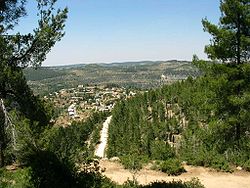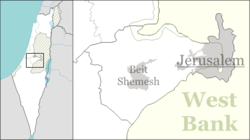| Revision as of 18:18, 11 October 2019 editBohemian Baltimore (talk | contribs)Autopatrolled, Extended confirmed users116,763 edits removed Category:Kurdish diaspora in Israel; added Category:Kurdish-Jewish culture in Israel using HotCat← Previous edit | Revision as of 14:12, 17 May 2020 edit undoBustan1498 (talk | contribs)179 edits →History: Added to historyTag: Visual editNext edit → | ||
| Line 18: | Line 18: | ||
| ==History== | ==History== | ||
| The moshav was founded in 1950 by ] returning from ]. The name was either taken from ''Even Sapir'', a book written in 1864 by ], a Jerusalem rabbi and emissary,<ref name="hareuveni lexicon">{{cite book|title=Lexicon of the Land of Israel|publisher=Miskal - Yedioth Ahronoth Books and Chemed Books|language=Hebrew|year=1999|first=Immanuel|last=HaReuveni|pages=19|isbn=965-448-413-7}}</ref> which describes his travels to ] in the 19th century,<ref></ref> or it was named after ], Israel's finance minister, who encouraged Jewish businessmen from the Diaspora to invest in Palestine and the nascent state.<ref> Esra Magazine</ref> | The moshav was founded in 1950 by ] returning from ] on the lands of the ] ] village of ]<ref>{{Cite book|last=|first=|url=https://www.worldcat.org/oclc/25632612|title=All that remains : the Palestinian villages occupied and depopulated by Israel in 1948|date=1992|publisher=Institute for Palestine Studies|others=Khalidi, Walid.|year=|isbn=0-88728-224-5|location=Washington, D.C.|pages=273|oclc=25632612}}</ref>. The name was either taken from ''Even Sapir'', a book written in 1864 by ], a Jerusalem rabbi and emissary,<ref name="hareuveni lexicon">{{cite book|title=Lexicon of the Land of Israel|publisher=Miskal - Yedioth Ahronoth Books and Chemed Books|language=Hebrew|year=1999|first=Immanuel|last=HaReuveni|pages=19|isbn=965-448-413-7}}</ref> which describes his travels to ] in the 19th century,<ref></ref> or it was named after ], Israel's finance minister, who encouraged Jewish businessmen from the Diaspora to invest in Palestine and the nascent state.<ref> Esra Magazine</ref> | ||
| To the north of the moshav is the ] and a cave attributed to ].<ref>]]</ref> | To the north of the moshav is the ] and a cave attributed to ].<ref>]]</ref> | ||
Revision as of 14:12, 17 May 2020
Place in Jerusalem, Israel| Even Sapir | |
|---|---|
 | |
 | |
| Coordinates: 31°45′46.8″N 35°8′4.55″E / 31.763000°N 35.1345972°E / 31.763000; 35.1345972 | |
| Country | Israel |
| District | Jerusalem |
| Council | Mateh Yehuda |
| Affiliation | Moshavim Movement |
| Founded | 1950 |
| Founded by | Kurdish immigrants |
| Population | 699 |
Even Sapir (Template:Lang-he-n, lit. Sapphire) is a moshav in central Israel. Located on the outskirts of Jerusalem, it falls under the jurisdiction of Mateh Yehuda Regional Council. In 2022 it had a population of 699.
History
The moshav was founded in 1950 by Hebrew repatriants returning from Kurdistan on the lands of the depopulated Palestinian village of Ein Karem. The name was either taken from Even Sapir, a book written in 1864 by Yaakov Halevi Sapir, a Jerusalem rabbi and emissary, which describes his travels to Yemen in the 19th century, or it was named after Pinchas Sapir, Israel's finance minister, who encouraged Jewish businessmen from the Diaspora to invest in Palestine and the nascent state.
To the north of the moshav is the Monastery of St. John in the Wilderness and a cave attributed to John the Baptist.
Even Sapir is one end point of the Jerusalem Trail, a 42-kilometer walking route around and through Jerusalem, which intersects with the Israel National Trail. The point of intersection is just outside Even Sapir at the Ein Hindak spring.
Even Sapir is a home to "Ben Gurion Institute of Science & Technology", Jerusalem Campus, a housing estate designated for 430 local and international students.
References
- ^ "Regional Statistics". Israel Central Bureau of Statistics. Retrieved 21 March 2024.
- All that remains : the Palestinian villages occupied and depopulated by Israel in 1948. Khalidi, Walid. Washington, D.C.: Institute for Palestine Studies. 1992. p. 273. ISBN 0-88728-224-5. OCLC 25632612.
{{cite book}}: CS1 maint: others (link) - HaReuveni, Immanuel (1999). Lexicon of the Land of Israel (in Hebrew). Miskal - Yedioth Ahronoth Books and Chemed Books. p. 19. ISBN 965-448-413-7.
- A Journey to Teman
- Judean mountains Esra Magazine
- Go with the flow, Jerusalem Post
- Jerusalem Trail
- "BGIST". Archived from the original on 2012-04-26. Retrieved 2011-12-20.